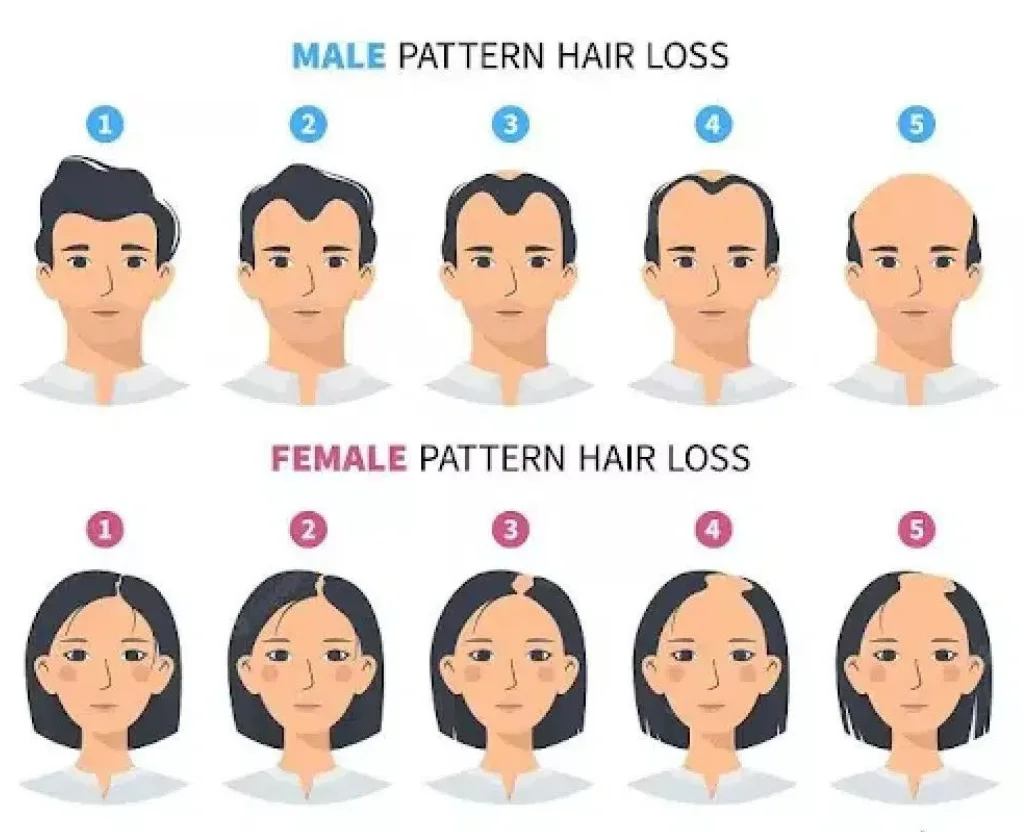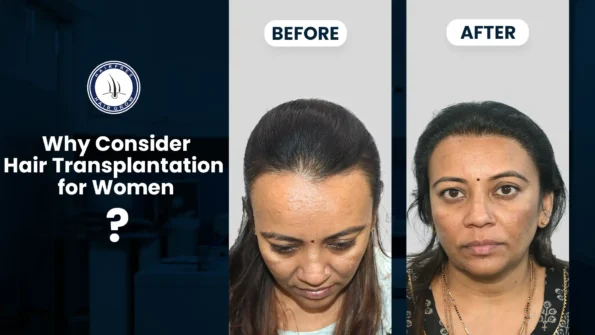Hair loss is challenging for both men and women, but for women, it can be particularly difficult to cope with as hair is often seen as a part of their identity. If a woman experiences excessive hair loss over a sustained period, it can be a cause for significant distress, leading them to seek ways to conceal the loss. While hair transplant for women is a common cosmetic procedure for men, it is also becoming increasingly popular among women.
HairFee HairGrow Clinic can provide support and solutions for women experiencing hair loss or female pattern baldness. If you are looking to restore your hairline or fill in areas of baldness, we encourage you to contact us to learn more about how we can help.
In this article, we’ll help answer all your questions about female hair loss. We’ll also explore whether hair transplantation surgery is the right choice for you.
What Causes Female Hair Loss?
Female hair loss is a common issue, affecting one in three women. While most cases are temporary, it’s crucial to address the underlying cause for hair to regrow.
Here are some common reasons for hair loss in women:
- Hormonal changes: Fluctuations in hormones, especially during pregnancy and menopause, can lead to hair shedding.
- Stress and mental health: Depression, anxiety, and significant life events can trigger hair loss.
- Medications: Certain medications can have hair loss as a side effect.
- Hair styling: Excessive heat styling, tight hairstyles, and hair extensions can damage hair and cause it to fall out.
- Allergies and scalp conditions: Allergic reactions and scalp trauma can also contribute to hair loss.
- Genetic factors: Androgenetic alopecia, a genetic condition, is a common cause of hair loss in both men and women.
- Nutritional deficiencies: Lack of essential vitamins and minerals can affect hair growth.
Hair transplants are a permanent solution for severe hair loss, but they are not suitable for everyone.
Who Are Good Female Candidates for Hair Transplants?
Research suggests that only 2-5% of women are eligible candidates for hair transplants because they have unsuitable donor hair. However, there are some cases where hair transplantation in women can significantly improve a patient’s appearance.
- Women with female pattern hair loss
- Women with a congenital elevated hairline
- Women with scarring alopecia
- Women experiencing hair loss after facelift procedures
- Women with traction alopecia
- Women with trichotillomania
- Transgender women seeking hairline adjustments
If you’re considering a hair transplant, it’s important to consult with a board-certified dermatologist or plastic surgeon who specializes in hair restoration.
Difference Between Hair Transplants in Men and Women
Reference image

Donor Scars
Women are generally less concerned about donor scars compared to men. Male patients often prefer to keep their hair short in the donor area, making procedures like Follicular Unit Transplantation (FUT) less ideal for them. On the other hand, women do not have a preference for short haircuts, allowing them to opt for FUT to maximize the number of grafts and reduce hair transplant costs.
Availability of Donor Scalp
Women without male pattern hair loss have a larger donor area because the hair at the top and crown of the head is not susceptible to hair loss. This is in contrast to men with advanced stages of hair loss, whose donor area is limited to hair on the back and sides of the head.
Use of Body Hair
While many men can benefit from using hair from other body parts like beards or body hair, most women do not have these options available for use in hair transplant procedures.
Hair Transplantation Options for Women Hair Loss
Female hair transplantation can be an effective treatment for hair loss in women, but it requires a thorough investigation of the causes before surgery. Factors determining eligibility include the reason for hair loss, the extent of hair loss, the health of the donor area, and the potential for worsening. Choosing a qualified surgeon is crucial for a safe and successful transplant.
The procedures involved:
- Follicular Unit Transplantation (FUT) or
- Follicular Unit Excision (FUE)
The best technique for women hair transplant surgery is generally the Follicular Unit Extraction (FUE) method, as it allows for precise placement of hair follicles and minimal scarring.
Post-transplant care is essential and includes following aftercare advice, avoiding strenuous activities, and not picking scabs. Results can be noticed after six months, with full results taking 12 to 18 months.
Costs vary based on the complexity of the procedure and the number of grafts needed. At HairFree HairGrow Clinic, transplants start at Rs 20 to Rs 40 per graft, with a minimum of 500 grafts required.
Female hair transplant surgery can potentially remedy the most severe hair loss cases. But given that only 2-5% of women will see results, you shouldn’t put all your hopes in the surgery.
A hair transplant is a permanent solution to hair loss. You can expect the transplanted hair to grow for life.
Alternative Ways to Treat Female Hair Loss
Hair transplantation is not the only solution for female hair loss, so if you’re deemed unsuitable for the procedure, don’t lose hope. There are alternative treatments available that can be just as effective. Here are some options to consider:
- Minoxidil (Rogaine): Available in topical and foam forms, Minoxidil is known to stimulate hair regrowth and accelerate the natural growth cycle of hair.
- Laser therapy: Low-level laser therapy (LLLT) involves using light therapy to improve blood flow to the hair follicles and promote hair growth.
- Corticosteroids: These anti-inflammatory medications are effective in treating autoimmune conditions like alopecia areata, which can cause hair loss.
- Platelet Rich Plasma (PRP) therapy: PRP therapy utilizes platelets from your own blood to stimulate hair growth when injected into balding areas of the scalp.
- Hormone therapy: Balancing estrogen and progesterone levels can help manage symptoms like hot flashes and night sweats while maintaining healthy hair.
- Scalp massages: Studies suggest that scalp massages can improve blood circulation in the scalp, ensuring that hair follicles receive necessary nutrients for growth.
- Balanced diet: A nutritious diet rich in protein and vitamins is essential for healthy hair growth. Making dietary changes can help address any nutritional deficiencies that may be contributing to hair loss.
- Hair loss shampoos: Medicated shampoos designed specifically for hair loss can help support hair health, nourish the scalp, and remove build-up that may impede hair growth.
Final Words
Hair transplantation is a complex procedure that requires careful consideration. Before undergoing surgery, it is crucial to consult with a certified trichologist to diagnose the cause of hair loss and determine if transplantation is the appropriate solution.
HairFree HairGrow Clinic has extensive experience treating women with hair loss and can assess suitability for transplantation. While many hair restoration surgeons specialize in the surgical procedure, they may not be experts in diagnosing hair loss. It is essential to verify the credentials of any doctor you consult to ensure they are qualified to address your specific needs.
- Visit any branch for your hair problem or call us at: +91-72 72 83 2222
- We are located in Surat, Pune (Pimple Gurav), Pune (Kharadi), Hyderabad, Ahmedabad, Kolkata, Indore, Bhopal, Delhi (Gurugram), Nagpur, Mumbai, Vapi (Silvassa), and Bangladesh.
Written By
MBBS, DVD (Skin & VD)
Dr. Ankit Jain is a leading hair restoration expert specializing in Hair Transplant for Women. With years of experience, he offers personalized solutions to restore hair growth, providing natural results and renewed confidence for women experiencing hair loss.
Disclaimer
We’ve made all possible efforts to ensure that the information provided here is accurate, up-to-date and complete, however, it should not be treated as a substitute for professional medical advice, diagnosis or treatment. See Detailed Disclaimers Here.



